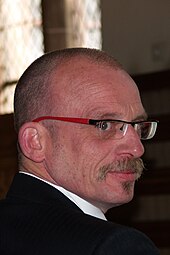Roland Freese
Roland Freese (born July 14, 1958 ) is a German forensic psychiatrist .
Life
Roland Freese is a specialist in psychiatry and forensic psychiatrist (DGPPN) and describes himself as a "forensic social psychiatrist". He first worked at the Gießen Psychiatric Hospital , switched to the Haina Clinic for Forensic Psychiatry in 1991 and became senior physician in 1998. In 1999 he took over as department head of the state-wide operating forensic specialist outpatient clinic Hessen (FFH), in whose development he played a key role. From 2003 to 2009 he was also the Medical Director of the Clinic for Forensic Psychiatry at the Center for Social Psychiatry (ZSP) Rheinblick in Eltville am Rhein . Since 2009 he has been Medical Director of the now independent Vitos forensic-psychiatric outpatient clinic in Hessen . Freese is also the spokesman for the nationwide ARGE forensic ambulances.
Freese has been a member of the Giessen Wingolf since 1980 .
plant
The outpatient clinic opened in Hesse in 1988 was the second in the Federal Republic of Germany after the first forensic outpatient clinic was founded in Berlin in 1987. Up until about 5 years ago, the average length of stay in the penal system increased in the Federal Republic. At the same time, between 1992 and 2004, the number of mentally disturbed law breakers accommodated in accordance with Section 63 of the Criminal Code doubled. In view of this development, the special situation of the forensic outpatient clinic in Hesse, co-founded and led by Freese, must be understood. In Hesse, contrary to the trend in the rest of Germany, the length of stay could be kept constant. More recent data even show a decrease in the length of stay in Hesse. In the literature, this is attributed to the relapse prevention work of the forensic ambulance under Freese. This fact justifies the favorable assessment of Freese's work in German textbooks
Fonts
- R. Freese: Outpatient crime therapy. Psychiatric crime therapy. Volume 2, Pabst Science Publishers, Lengerich 2003, ISBN 3-89967-036-1 .
Individual evidence
- ^ M. Warmuth: Three years forensic-psychiatric outpatient clinic in West Berlin. Building-experience-consequences. In: Law and Psychiatry. 8, 1990, pp. 109-120.
- ↑ D. Seifert, S. Möller-Mussavi: Current relapse data from the Essen prospective prognosis study. In: Fortschr. Neurol. Psychiatr. 73, 2005, pp. 16-22.
- ↑ N. Leygraf: Outpatient treatment options. In: HL. Kröber among others: Handbook of Forensic Psychiatry. Volume 3: Psychiatric crime prognosis and crime therapy. Steinkopf, Darmstadt 2006, ISBN 3-7985-1442-9 , p. 242.
- ↑ N. Leygraf: Outpatient treatment options. In: HL. Kröber among others: Handbook of Forensic Psychiatry. Volume 3: Psychiatric crime prognosis and crime therapy. Steinkopf, Darmstadt 2006, p. 248.
- ↑ Rüdiger Müller-Isberner among others: Developments in the psychiatric prison system in Hesse. In: Forens. Psychiatr. Psychol. Criminol. 1, 2007, pp. 43-49.
- ↑ N. Leygraf: Outpatient treatment options. In: HL. Kröber among others: Handbook of Forensic Psychiatry. Volume 3: Psychiatric crime prognosis and crime therapy. Steinkopf, Darmstadt 2006, ISBN 3-7985-1442-9 , p. 248.
- ↑ Rüdiger Müller Isberner, Sabine Eucker: Therapy in the prison system . Medical Scientific Publishing Company, Berlin 2009, ISBN 978-3-941468-13-9 .
- ↑ N. Leygraf: Outpatient treatment options. In: HL. Kröber among others: Handbook of Forensic Psychiatry. Volume 3: Psychiatric crime prognosis and crime therapy. Steinkopf, Darmstadt 2006, pp. 242-254.
- ^ Rüdiger Müller Isberner: Therapy in the penal system (§63 StGB). In: Klaus Förster (ed.): Psychiatric assessment. Urban & Fischer Verlag, Munich 2004, ISBN 3-437-22900-1 , pp. 417-437.
Web links
- Forensic-psychiatric outpatient clinic in Hessen , outpatient crime therapy
| personal data | |
|---|---|
| SURNAME | Freese, Roland |
| BRIEF DESCRIPTION | German forensic psychiatrist |
| DATE OF BIRTH | July 14, 1958 |
